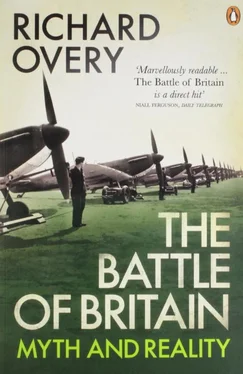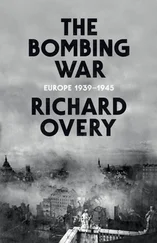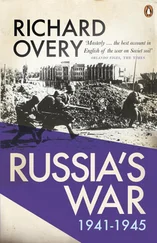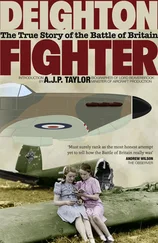It was not moral scruple that held them back. They simply did not believe that these were strategically desirable targets. Neither promised immediate results given the nature of current air technology; neither would necessarily bring the enemy armed forces any closer to defeat. The manual for ‘The Conduct of Air Warfare’ first drawn up in 1936, and revised in March 1940, directed German air fleets to seek out the enemy air and ground forces and inflict upon them debilitating blows. Joint manoeuvres carried out with the army from 1935 onwards showed what could be achieved when armies and air forces fought together. The proof was supplied in the swift demolition of Polish resistance in September 1939. When planning began for the next campaign against Britain and France, it was based on the same formula of fast, hard-hitting air and armoured forces, designed to win a swift battle of annihilation. What were defined as ‘terror attacks’ against civilian targets far from the scene of battle were to be permitted only in retaliation for terror attacks by the enemy. 3
The British were largely unprepared for this kind of warfare. Until February 1939, when Chamberlain publicly pledged British military support for France, Britain did not even have a Continental ally to consider. British strategy in the 1930s was insular. The government’s first priority was the protection of the British imperial heartland, even if this meant starving the global empire of adequate resources for its defence. Hence the decision, taken when British rearmament began in earnest in 1936, to allocate the lion’s share of resources to the Royal Air Force and the Royal Navy. Britain’s offensive capability remained dangerously underdeveloped. Even by 1939 only two fully equipped divisions were available immediately to fight in Europe; Bomber Command, the much-vaunted striking arm of the RAF, had fewer than 500 aircraft when war broke out, incapable of reaching very far into German territory. British preparations had been based on the narrow objective of avoiding defeat and conquest. This was scarcely the state of mind necessary to conduct a major land campaign in Europe.
The fundamental ambiguity at the heart of British military preparations explains the flawed response to the demands of coalition warfare. There was little the British could do to help Poland. Assistance to France was compromised by the small scale of the army Britain sent, and by an unwillingness to commit to the land campaign aircraft that had been assigned to Britain’s own defence. The aircraft that were sent out to make up the British Advanced Air Striking Force (an organization only a little larger than the Polish Air Force, which German aviators had snuffed out in a few days) were rendered ineffective by the poor state of Allied communications and the French insistence that aircraft fight a short-range, army co-operation role to which the RAF had given almost no serious thought.
When the attack on France came on 10 May 1940, these deficiencies were soon exposed. There was often a lapse of four or five hours between sighting a fleeting battlefield target and the despatch of instructions for aircraft to attack it. British bombers in France (most of them light Battle and Blenheim aircraft, which were utterly outclassed in daylight combat) had to wait for orders to be routed from France, through Bomber Command headquarters near London, and back again to France. 4Co-operation with the army was rudimentary. While 380 dive-bombers gave close air support to advancing German troops, often reacting within minutes of a radioed request, the RAF managed between September 1939 and March 1940 to train a mere seven pilots in dive-bombing techniques, who between them dropped just 56 bombs in practice. When the French asked the RAF what Bomber Command could do to interrupt the remorseless progress of German forces, they were told that the most they could expect was the temporary disruption of three railway lines. 5
The only serious contribution made by the RAF came with the deployment of squadrons of Hurricane fighters, which had been intended for Britain’s own defence. As the battle in France deepened during May 1940, more and more Hurricanes had to be sent in piecemeal to stem the haemorrhage of Allied air power. Without the home advantages of prepared bases and radar warning, fighter losses were high. In May and June, 477 fighters were destroyed and 284 pilots killed, rates of loss not far short of those later in the summer. So severe was the drain on home defence that the commander-in-chief of Fighter Command, Sir Hugh Dowding, took the unprecedented step of talking directly to the War Cabinet on 15 May to plead for restraint. ‘I saw my resources slipping away,’ he later wrote, ‘like sand in an hourglass.’ 6The politicians only half responded to his argument. Churchill insisted on sending further Hurricanes, but the French got none of the coveted high-performance Spitfires. Only when British forces were pinned back on Dunkirk and faced with annihilation in the last week of May did the RAF get drawn into the battle in strength. Flying from bases in southern Britain, at the limit of their range, they established brief periods of air superiority over the beaches, and inflicted 132 aircraft losses on the German Air Force in three days of fighting. Spitfires were used in this later phase of the battle in France, but 155 of them were lost, 65 of them in accidents as aircrew tried to master the new equipment. The Dunkirk evacuation was the starting point of almost a year of continuous air combat for the defence of Britain. 7
The contest that Britain faced after Dunkirk was the war Britain had expected. It was in effect to be a ‘Chamberlain war’, for this was the kind of defensive conflict he had anticipated and prepared for in the 1930s. But it was not a campaign that Chamberlain was destined to lead. His government had fallen on 10 May, following widespread criticism of its spiritless and ineffectual leadership. On the day that German forces invaded France and the Low Countries, he was succeeded by Winston Churchill. Here was a man whose instincts were flamboyantly bellicose. He relished the conflict in France (Churchill ‘likes war’ Lloyd George once remarked, not altogether charitably). He was shocked at the defeat of France, and promised French leaders that he would ‘fight on for ever and ever and ever’. It was Churchill who on 18 June 1940 memorably defined the coming contest when he told the House of Commons that ‘the Battle of France is over. I expect the battle of Britain is about to begin.’ 8
If this speech inspired many, it alienated others. Churchill was not the conductor of a well-drilled orchestra playing in defiant unison. Defeat in Europe in May left British strategy in tatters. Under such dangerous circumstances it is perhaps unsurprising that arguments should surface for a compromise peace with Hitler. The critical turning-point came at the end of May. Prompted by feelers from the Italian ambassador in London, the Foreign Secretary, Lord Halifax, asked the Cabinet to consider the possibility that Britain might have to seek a peace. Halifax was repelled by Churchill’s rhetorical style and his Boy ’ s Own zest for fighting to the death. After Cabinet on 27 May he complained that the prime minister ‘talked the most dreadful rot’, and persisted in his effort to base British policy on what he termed ‘common sense and not bravado’. 9A tense meeting on 28 May left Halifax isolated. Churchill had no intention of ending his brief wartime premiership sullied by surrender. The government remained committed to the fight. Though appeasement might have seemed irresistible at such a moment, Chamberlain supported Churchill, a factor overlooked by the many later critics. This was of profound importance, for it brought to his side the bulk of the Conservative Party – many of whom distrusted Churchill as a renegade and a charlatan – together with the Liberal and Labour ranks in Parliament upon whose support Churchill’s choice as prime minister had rested. Churchill could now fight Chamberlain’s war.
Читать дальше












